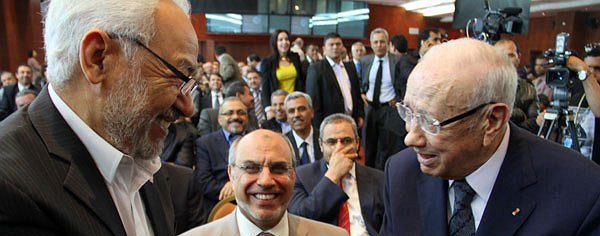People often say more outside when the interview is finished. You go with a set of questions, and everything goes as planned. But once you switch off your camera and chat informally, then people open up and begin to tell you stories and information that is invaluable. So if they say something important or interesting after the interview, just ask them if you can use it.
Two of my favourite interviews were with the Tunisian president, Beji Caid Essebsi, and the leader of the Annahda party, Rached Ghannouchi, which ran simultaneously in Al Hayat in 2013. To interview two key figures, who were at loggerheads, when Tunisian history was in the making, was a great opportunity for me. I was able to get the interviews at a time when the two men weren’t very accessible to the media.
I acknowledge that I cannot separate my political and personal views, and this can affect my interviews. I try to balance that but it is difficult
The fact that I was not politically or personally involved with what was happening in Tunis enabled me to ask a lot of questions. I was able to get Ghannouchi to acknowledge that there are fanatic (Salafist) elements within Annahda, and this became headline news. I also challenged Essebsi, who was in his 80’s, on whether he was too old to represent a revolution primarily led by youth. My Tunisian fixer was shocked when she heard me say this, but I think I was able to ask such questions comfortably because I was politically detached from Tunis.
It was only after the interviews were published that I realised how important these questions and this freedom had been.
We live and work in a region where we are personally and emotionally invested in the story, and I am particularly aware of this when I cover Lebanon and Syria. I acknowledge that I cannot separate my political and personal views, and this can affect my interviews. I try to balance that but it is difficult.
My worst interview was for a book about sectarian shifts in Lebanese society. I was conducting the interviews jointly with a male colleague. Some of the interviewees were very conservative - even the women preferred to talk to my colleague than me! One man in particular refused to even look at me. I would ask him a question and he would answer my colleague. I was fed up and told him firmly that I was the one asking the questions, and he still refused to look at me or talk to me. I was very upset and I stopped asking questions. In hindsight, I could have given my questions to my colleague but I was angry and I didn’t think this was the right solution.
A trick I often use is to ask to use the bathroom in the middle of the interview, even if I don’t need to. It creates a pause, which can help relax people, and it also gives you a chance to see a little bit more of the office or space where the interview is taking place. When I interviewed Ghannouchi, one of his female assistance escorted me to the bathroom. I noticed that some of the female staff in his office did not wear hijab. Even if this piece of information doesn’t make it in the story, it can still tell you a lot about the person and their values.
I know it’s an awkward request. But remember, while some officials will not give you permission to go for a walk around their headquarters and explore the place, no one will refuse your request to go to the bathroom!
Photo: Tunisian president Beji Caid Essebsi and Annahda party leader Rached Gannouchi, both of whom were interviewed by Bissane El Cheikh in 2013.
